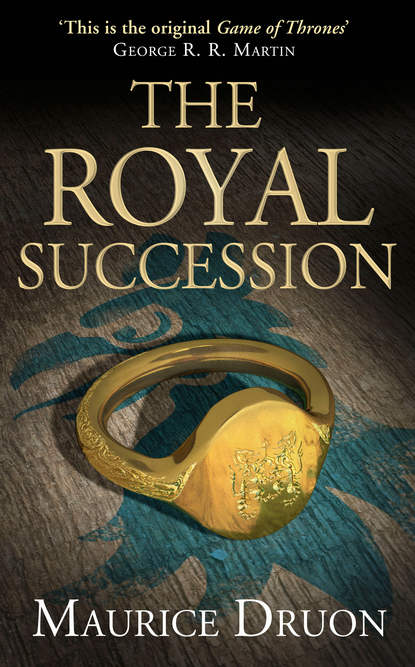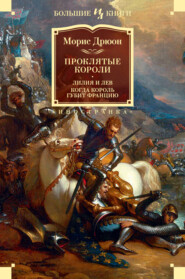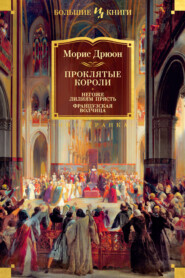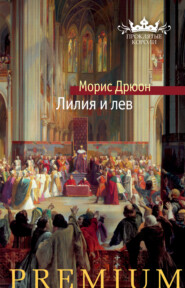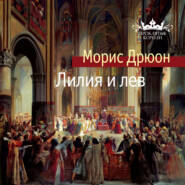По всем вопросам обращайтесь на: info@litportal.ru
(©) 2003-2025.
✖
The Royal Succession
Автор
Год написания книги
2019
Настройки чтения
Размер шрифта
Высота строк
Поля
Nevertheless, beneath the folds of her dress, a new life was forming: Clémence was pregnant; and she was obsessed by the thought that her husband would never know his child.
‘If only Louis had lived long enough to see his child born!’ she thought. ‘Five months, only five months longer! How happy he would have been, particularly if it is a son. If I had only become pregnant on our wedding night!’
The Queen turned wearily to look at the Count of Valois, who was strutting up and down the room like a cock on a dunghill.
‘But why, Uncle, why should anyone have been so wicked as to poison him?’ she asked. ‘Did he not do all the good in his power? Why are you always searching for the wickedness of man where, doubtless, there is but a manifestation of the Divine Will?’
‘You are on this occasion alone in rendering to God that which seems rather to belong to the machinations of the Devil,’ replied Charles of Valois.
The great crest of his hood falling on his shoulder, his nose strong, his cheeks bloated and high of colour, his stomach thrust well to the fore, dressed in the same suit of black velvet with silver clasps which he had worn eighteen months earlier at the funeral of his brother Philip the Fair, Monseigneur of Valois had just returned from Saint-Denis, where he had been burying his nephew, Louis X. The ceremony had created a problem or two for him, because, for the first time since the ritual of royal burials had been established, the officers of the household, having cried: ‘The King is dead!’ had been unable to add: ‘Long live the King!’; and no one knew before whom the various rites, normally appropriate to the new sovereign, should be performed.
‘Very well! Break your wand before me,’ Valois had said to the Grand Chamberlain, Mathieu de Trye. ‘I am the eldest of the family and take precedence.’
But his half-brother, the Count of Evreux, had taken exception to this peculiar innovation, for Charles of Valois would certainly have taken advantage of it as an argument for his being recognized as Regent.
‘The eldest of the family, if you mean it in that sense,’ the Count of Evreux had said, ‘is not you, Charles. Our Uncle Robert of Clermont is the son of Saint Louis. Have you forgotten that he is still alive?’
‘You know very well that poor Robert is mad and that his clouded mind cannot be relied on in anything,’ Valois had replied, shrugging his shoulders.
In the end, after the funeral feast, which had been held in the abbey, the Grand Chamberlain had broken the insignia of his office before an empty chair.
‘Did not Louis give alms to the poor? Did he not pardon many prisoners?’ Clémence went on, as if she were trying to convince herself. ‘He had a generous heart, I assure you. If he sinned, he repented.’
It was clearly not the moment to contest the virtues with which the Queen embellished the recent memory of her husband. Nevertheless, Charles of Valois found it impossible to control an outburst of ill-humour.
‘I know, Niece, I know,’ he replied, ‘that you had a most pious influence on him, and that he was extremely generous … to you. But one cannot rule by Paternosters alone, nor by heaping presents on those one loves. Repentance is not enough to disarm the hatreds one has sown.’
‘So now,’ Clémence thought, ‘Charles, who laid a claim to power while Louis was alive, is denying him already. And soon I shall be reproached with all the presents he gave me. I have become the foreigner.’
She was too weak, too overcome to find the strength for indignation. She merely said: ‘I cannot believe that Louis was so hated that anyone would wish to kill him.’
‘All right, don’t believe it, Niece,’ cried Valois; ‘but it’s the fact! There’s the proof of the dog that licked the linen used for removing the entrails during the embalming and died an hour later. There’s …’
Clémence closed her eyes and clutched the arms of her chair in order not to reel at the vision it conjured up in her mind. How could anyone speak so cruelly of her husband, the King who had slept beside her, the father of the child she carried, compelling her to imagine the corpse beneath the knives of the embalmers?
Monseigneur of Valois continued to develop his macabre thesis. When would he stop talking, that fat, restless, vain authoritarian who, dressed sometimes in blue, sometimes in red, sometimes in black, had appeared at every important or tragic hour in Clémence’s life during the ten months she had been in France, to lecture her, deafen her with words and compel her to act against her will? Even on the morning of her marriage at Saint-Lyé, Uncle Valois, whom Clémence had scarcely ever seen, had almost spoiled the ceremony by instructing her in court intrigues of which she understood nothing. Clémence remembered Louis coming to meet her on the Troyes road, the country church, the room in the little castle, so hastily furnished as a nuptial chamber. ‘Did I realize my happiness? No, I must not weep in front of him,’ she thought.
‘Who the author of this appalling crime may be,’ went on Valois, ‘we do not yet know; but we shall discover him, Niece, I give you my solemn promise. If I am given the necessary powers, that is. We kings …’
Valois never lost an opportunity of reminding people of the fact that he had worn two crowns, which, though they were purely nominal, still put him on an equal footing with sovereign princes.
‘We kings have enemies who are less hostile to our persons than to the decisions of our power; and there are many people who might have an interest in making you a widow. There are the Templars, whose Order, as I said at the time, it was a great mistake to suppress. They formed a secret conspiracy and swore to kill my brother and his sons. My brother is dead, his eldest son has followed him. There are the Roman Cardinals. Do you remember Cardinal Caetani’s attempt to cast a spell on Louis and your brother-in-law of Poitiers, both of whom he wished to destroy? The attempt was discovered, but Caetani may well have struck by other means. What do you expect? One cannot remove the Pope from the throne of Saint Peter, as my brother did, without arousing resentment. It is also possible that supporters of the Duke of Burgundy may still feel bitter about Marguerite’s punishment, to say nothing of the fact that you replaced her.’
Clémence looked Charles of Valois straight in the eye, which embarrassed him and made him flush a little. He had had some hand in Marguerite’s murder. He now realized that Clémence knew it; through Louis’s rash confidences no doubt.
But Clémence said nothing; it was a subject she was chary of broaching. She felt that she was involuntarily to blame. For her husband, whose virtues she boasted, had nevertheless had his first wife strangled so that he might marry her, Clémence, the niece of the King of Naples. Need one look further for the cause of God’s punishment?
‘And then there is your neighbour, the Countess Mahaut,’ Valois hurried on, ‘who is not the woman to shrink from crime, even the worst …’
‘How does she differ from you?’ thought Clémence, not daring to reply. ‘Nobody seems to shrink much from killing at this Court.’
‘And less than a month ago, to compel her to submit, Louis confiscated her county of Artois.’
For a moment Clémence wondered if Valois were not inventing all these possible culprits in order to conceal the fact that he was himself the author of the crime. But she was immediately horror-struck at the thought, for which there was indeed no possible basis. No, she refused to suspect anyone; she wanted Louis to have died a natural death. Nevertheless, Clémence gazed unconsciously out of the open window towards the south where, beyond the trees of the Forest of Vincennes, lay the Château of Conflans, Countess Mahaut’s summer residence. A few days before Louis’s death, Mahaut, accompanied by her daughter, the Countess of Poitiers, had paid Clémence a visit: an extremely polite visit. Clémence had not left them alone for a single instant. They had admired the tapestries in her room.
‘Nothing is more degrading than to imagine that there is a criminal among the people about one,’ thought Clémence, ‘and to start looking for treason in every face.’
‘That is why, my dear Niece,’ went on Valois, ‘you must return to Paris as I asked you. You know how fond of you I am. I arranged your marriage. Your father was my brother-in-law. Listen to me as you would have listened to him, had God spared him. The hand that struck down Louis may intend pursuing its vengeance on you and on the child you carry. I cannot leave you here, in the middle of the forest, at the mercy of the machinations of the wicked, and I shall be easy only when you are living close to me.’
For the last hour Valois had been trying to persuade Clémence to return to the Palace of the Cité, because he had decided to go there himself. It formed part of his plan for assuming the regency and facing the Council of Peers with the accomplished fact. Whoever was master in the Palace had the trappings of power. But to install himself there on his own might look as if he were usurping it by force. If, on the other hand, he entered the Cité in his niece’s wake, as her nearest relative and protector, no one could oppose it. The Queen’s condition was, at this moment, the best pledge of respect and the most effective instrument of government.
Clémence turned her head, as if to ask for help, towards a third person who was standing silently a few paces from her, his hands crossed on the hilt of a long sword, as he listened to the conversation.
‘Bouville, what should I do?’ she murmured.
Hugues de Bouville, ex-Grand Chamberlain to Philip the Fair, had been appointed Curator of the Stomach by the first Council which had followed on the death of the Hutin. This good man, now growing stout and grey, but still extremely alert, who had been an exemplary royal servant for thirty years, took his new duties most seriously, if not tragically. He had formed a corps of carefully picked gentlemen, who mounted guard in detachments of twenty-four over the Queen’s door. He himself had donned his armour and, in the heat of June, large drops of sweat were running down under his coat of mail. The walls, the courtyards, indeed the whole perimeter of Vincennes, were stuffed with archers. Every kitchen-hand was constantly escorted by a sergeant-at-arms. Even the ladies-in-waiting were searched before entering the royal apartments. Never had a human life been guarded so closely as that which slumbered in the womb of the Queen of France.
In theory Bouville shared his duties with the old Sire de Joinville, who had been appointed Second Curator; the latter had been selected because he happened to be in Paris where he had come to draw, as he did twice a year, with the fussy punctuality of an old man, the income from the endowments conferred on him in three successive reigns, and in particular when Saint Louis was canonized. But the Hereditary Seneschal of Champagne was now ninety-two years old; he was practically the doyen of the high French nobility. He was half-blind and this last journey from his Château de Wassy in the Haute-Marne had tired him out. He spent most of his time dozing in the company of his two white-bearded equerries, so that all the duties had to be performed by Bouville alone.
For Queen Clémence, Bouville was linked with all her happiest memories. He had been the ambassador who had come to ask her hand in marriage and had escorted her from Naples; he was her utterly devoted confidant and probably the only true friend she had at the French Court. Bouville had perfectly understood that Clémence did not wish to leave Vincennes.
‘Monseigneur,’ he said to Valois, ‘I can better assure the safety of the Queen in this manor with its close, surrounding walls than in the great Palace of the Cité, open to all comers. And if you are worried about the Countess Mahaut being near, I can inform you, for I am kept in touch with everything that goes on in the neighbourhood, that Madame Mahaut’s wagons are at this moment being loaded for Paris.’
Valois was considerably annoyed by the air of importance Bouville had assumed since he had become Curator, and by his insistence on remaining there, stuck to his sword, by the Queen’s side.
‘Monsieur Hugues,’ he said haughtily, ‘your duty is to watch over the stomach, not to decide where the royal family shall reside, nor to defend the whole kingdom on your own.’
Not in the least perturbed, Bouville replied: ‘I must also remind you, Monseigneur, that the Queen cannot appear in public until forty days have elapsed since her bereavement.’
‘I know the custom as well as you do, my good man! Who said that the Queen would show herself in public? She shall travel in a closed coach. Really, Niece,’ Valois cried, turning to Clémence, ‘anyone would think that I was trying to send you to the country of the Great Khan, and that Vincennes was two thousand leagues from Paris!’
‘You must understand, Uncle,’ Clémence replied weakly, ‘that living at Vincennes is my last gift from Louis. He gave me this house, in there, and you were present’ – she fluttered her hand towards the room in which Louis X had died – ‘that I might live in it. It seems to me that he has not really departed. You must understand that it’s here that we had …’
But Monseigneur of Valois could not understand the claims of memory or the imaginings of sorrow.
‘Your husband, for whom we pray, my dear Niece, belongs henceforth to the kingdom’s past. But you carry its future. By exposing your life, you expose that of your child. Louis, who sees you from on high, would never forgive you.’
The shot went home, and Clémence sank back in her chair without another word.
But Bouville declared that he could decide nothing without the agreement of the Sire de Joinville, and sent someone to look for him. They waited several minutes. Then the door opened, and they waited again. At last, dressed in a long robe such as had been worn at the time of the Crusade, trembling in every limb, his skin mottled and like the bark of a tree, his eyes with their faded irises watering, Saint Louis’s last companion-at-arms entered, dragging his feet, supported by his equerries, who tottered almost as much as he did. He was given a seat with all the respect to which he was entitled, and Valois began to explain his intentions about the Queen. The old man listened, solemnly nodding his head, obviously delighted still to have some part to play. When Valois had finished, the Seneschal fell into a meditation they were careful not to disturb; they waited for the oracle to speak. Suddenly he asked: ‘But where is the King then?’
Valois looked crestfallen. So much useless trouble, and when time pressed! Did the Seneschal still understand what was said to him?
‘But the King is dead, Messire de Joinville,’ he replied, ‘and we buried him this morning. You know that you have been appointed Curator.’
The Seneschal frowned and seemed to be making a great effort to recollect. Indeed, failure of memory was no new thing with him; when he was nearly eighty and dictating his famous Memoirs, he had not realized that towards the end of the second part he was repeating almost word for word what he had already said in the first.
‘Yes, our young Sire Louis,’ he said at last. ‘He is dead. It was to himself that I presented my great book. Do you know that this is the fourth king I have seen die?’





